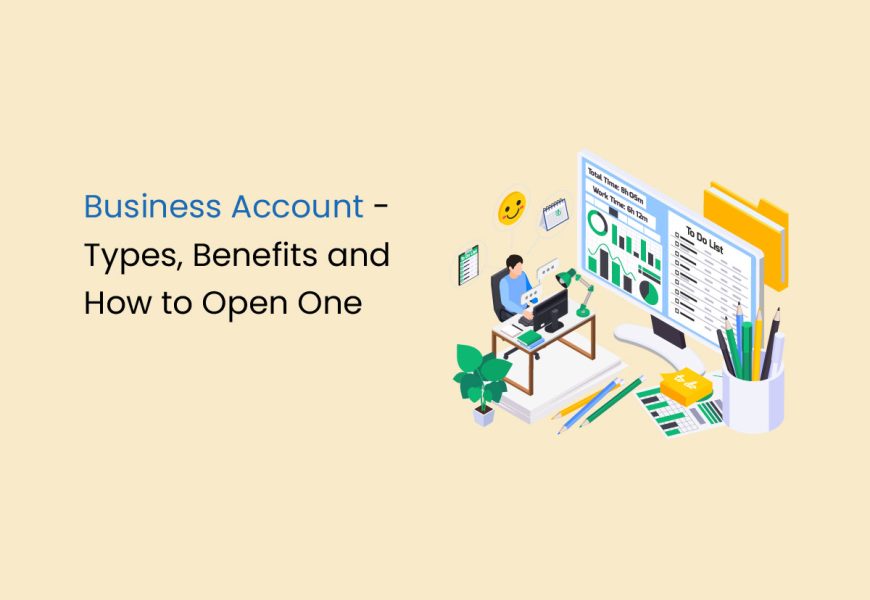A business account is a bank account designed explicitly for business owners to handle their cash flow. Business owners must comprehend the importance of a business account and how it helps manage their finances.
One of the most important principles of business management is keeping personal finances separate from business finances. A business account is the most suitable option to manage business funds transparently. Regardless of the business’s type, size, or operations, having a business account can significantly benefit the business.
What is a Business Account?
A business account is a bank account designed for individuals who own and manage businesses. It is a current account that business owners and proprietors use to keep track of their business’s financial transactions. There are multiple types of business bank accounts, and the type chosen depends on the nature of the business.
Business accounts typically come with additional features that can be very helpful for managing business finances. These features may include overdraft protection, multi-user authorisation, merchant services, accounting integrations, etc. All of these features can significantly benefit a business’s financial management.
Through a business account, business owners can easily monitor cash balances, pay their employees, and keep track of any money owed to the business or other creditors. A business cannot function properly without a business account, even for a single day.
Who Should Have a Business Account?
A business account is necessary for anyone who owns or wants to start a small business. Start-ups are especially required to open a business account to seek financial assistance from financial institutions. The following entities can open a business account:
- Individuals
- Proprietorships
- Companies
- Partnership Firms
- Foundations/ Trusts/ Societies
Need for a Business Account
The following are the reasons why one needs a business account:
- To receive and pay money related to business operations
- For conducting monetary transactions in a unified manner
- To borrow money from financial institutions as seed capital for the business
- For safeguarding business funds from being embezzled or stolen
- To streamline business operations to add professionalism to the industry.
How does a Business Account Work?
A business account functions similarly to a savings account. However, the difference is that it is solely intended for business transactions. Like a regular bank account, an individual can use their business account to pay employee salaries and bills, purchase raw materials, and more. Some of the key features of a business banking account are as follows:
- Similar to a personal bank account, a business account allows for the payment of bills and salaries and the purchase of raw materials and inventory by the business.
- A business account can assist business owners in saving money for unexpected business-related expenses.
- For companies engaged in eCommerce, a business account can be used to receive payments seamlessly and safely.
- A business account is beneficial for companies involved in international trade as it facilitates sending and receiving money from abroad.
- A business account can be a crucial stepping stone towards building a successful commercial empire for small-scale start-ups.
Benefits of a Business Account
The benefits of a business account for businesses are as follows:
- Line of Credit: One of the most significant benefits of a business account is access to a line of credit. However, not all banks offer this service, so it’s wise to check with the bank first. This credit line should only be used for urgent business needs. Some examples include unexpected expenses, cash flow problems, or temporary revenue shortfalls. When taking out a loan, an individual should know its interest rates and associated fees.
- Ease of Purchase: Businesses must protect their customers’ information from theft or misrepresentation when purchasing goods. To address this concern, businesses can opt for a business account that streamlines purchases securely. A business account provides security and privacy to the customer’s information. Moreover, it ensures that the customer’s data is not leaked to criminal elements.
- Protection of Liabilities: Keeping track of a business’s liabilities when managing a business is important. To help manage these liabilities, having a separate bank account for the business is a good idea. This will keep the business funds separate from personal funds, making it easier to track expenses, manage cash flow, and prepare financial statements. A separate account also helps protect personal assets in case of legal action against the business.
- Safety of Funds: A business account is important because it protects individuals’ funds from losses. This is especially true for businesses that deal with many incoming and outgoing transactions, which can be vulnerable to theft and other risks. Having a separate business account can help one avoid these risks and ensure that their funds are protected. Business accounts offer advanced security features such as fraud monitoring and encryption technologies to keep funds safe.
- Transparency: Operating a business through a centralised bank account has numerous benefits, including enhanced transparency. With a business account, all transactions can be tracked and accounted for, ensuring no ambiguity and financial irregularity. This promotes accountability and trust between business partners, investors, and customers. Moreover, having a centralised business account makes financial management and record-keeping easier.
Types of Business Account
The types of business accounts are as follows:
- Checking Account: A checking account is necessary to manage a business’s finances. It is the most commonly used business account and helps with daily financial operations. This account is used for depositing and withdrawing money, where businesses manage payroll, bills, and sales deposits. However, checking accounts don’t earn interest on earnings. Businesses may consider a savings account or other investment options to earn interest.
- Savings Account: A business savings account is designed to help businesses save money and earn interest over time. However, savings accounts offer lower interest rates than other accounts. Business savings accounts can offer different interest rates depending on how much money is deposited. This means that the more money deposited, the higher the interest rate. However, some accounts charge fees, so it is essential to read the terms and conditions carefully before opening an account.
- Payroll Account: A payroll account is a specific business account solely managing payroll services. This account allows companies to pay employee salaries and fulfil payroll tax obligations. Money is transferred from the business’s checking account to fund this account. Although a payroll account can seem like an added responsibility, it helps to simplify tracking payments for accounting and tax purposes. Businesses can easily monitor their payroll expenses by paying employees from a separate account.
- Merchant Account: A merchant account is a specialised business account that allows merchants to receive payments via credit or debit cards. These accounts monitor all business transactions, including receivables and payables. Merchant accounts are essential for eCommerce businesses that rely on online transactions, providing a secure and reliable platform for processing payments and ensuring quick and easy payment processing for a seamless customer experience.
- Money Market Account: Savings and money market accounts are similar but differ. Money market accounts offer higher interest rates than savings accounts. These accounts are designed for businesses that need to access their funds frequently. They combine features of both checking and savings accounts. But, they typically require a higher minimum balance and may limit withdrawals. They also limit how many withdrawals can be made each month. Business owners can withdraw up to 6 times every six months. Teller withdrawals do not count towards the limit.
How to Open a Business Account
An individual can open a business account by following these steps:
- The first step towards starting a legally-operating business is to register the business under the Companies Act 2013.
- The next step is to apply for licenses from various government agencies, such as income tax and customs, necessary for commercial businesses.
- Once the individual obtains the business license, they can proceed to the online portal of a bank or financial institution where they wish to open a business account.
- The individual must complete and submit the form and the required documents. The KYC documents can be uploaded online or submitted in person at the bank’s branch.
- After receiving the application and documents, the bank or financial institution will verify every detail. If everything is in order, the individual’s account will be opened.
Documents Required to Open a Business Account
The following documents are needed to open a business account:
- Identity proof (PAN card or Aadhaar card)
- Address proof (water bill, electricity bill, etc.)
- Business address proof
- IT returns
- Passport-size photographs
- Certificate of Business Incorporation
- Details of an existing bank account
- Current business licence
- An account opening cheque
How To Choose the Best Business Account?
A good business account should have the following features and services:
Advanced Financial Management
Advanced Financial Management is a comprehensive solution that simplifies and streamlines financial management processes. A business account should have the following:
- Seamless Transactions: A good current should offer seamless functionality for deposits, transfers, payments, and bill payments, providing businesses the flexibility and convenience to conduct transactions effortlessly.
- Real-Time Insights: Real-time insights into cash flow are indispensable for making informed financial decisions and driving business growth. By accessing real-time data and analytics, businesses can identify trends, proactively address financial challenges, and monitor key performance indicators.
- Integrated Solutions: Seamless integration with popular accounting software and payroll services can simplify financial management processes significantly. Integrated solutions provide a complete view of financial data, streamlining workflows, enabling better collaboration and helping optimise resource allocation for increased productivity and profitability.
Security and Control
Maintaining security and control over one’s finances is one of the most crucial aspects of managing a business. To help with this, business accounts offer the following features:
- Multi-User Access: Giving appropriate levels of access and permissions to team members can protect sensitive financial information and prevent internal fraud or misuse of financial resources. This granular control ensures that only authorised personnel can access financial data and transactions, reducing the risk of unauthorised access to sensitive information and financial resources.
- Advanced Fraud Protection: Advanced fraud protection features, including real-time detection and alerts, safeguard businesses against financial fraud and cyberattacks. Timely alerts enable businesses to take immediate action to prevent financial loss and reputational damage.
- Dedicated Customer Support: A responsive and knowledgeable business banking team is essential for quickly managing finances, resolving issues, and achieving financial goals. They can help whether there is an issue with a transaction, questions about the account, or simply discussing a business’s financial goals.
Scalability and Growth
Small businesses often struggle to access credit facilities tailored to their needs and future growth plans. The following business account features can be of help to them:
- Flexible Financing Options: Flexible financing options, such as lines of credit, term loans, or business credit cards, can provide small business owners with the capital they need to manage cash flow, invest in growth opportunities, and navigate financial challenges.
- Merchant Services: By integrating solutions, small business owners can effortlessly accept payments, manage inventory, track sales performance, and provide personalised customer service. These integrated solutions improve operational efficiency and enable small businesses to more effectively adapt to changing consumer preferences and market trends.
- International Capabilities: Small businesses that aim to grow their reach globally face the challenge of dealing with cross-border transactions and managing foreign exchange risks. Access to convenient international capabilities, such as online payment systems, currency conversion services, and cross-border payment solutions, can simplify conducting business across borders.
Personalised Support and Expertise
Personalised support and expertise are invaluable resources for businesses seeking to optimise their financial management strategies and achieve long-term success. Some services that business accounts provide are as follows:
- Dedicated Account Manager: Businesses can benefit from having access to a dedicated business banking professional who can offer personalised support and expert guidance based on their specific needs and objectives. With the help of a dedicated account manager, businesses can expect to receive a deep understanding of their industry and the challenges and opportunities that come with it.
- Financial Planning Tools: Businesses must use financial planning tools to predict cash flow, establish budgets, and make informed financial decisions. Accurate forecasting allows businesses to anticipate changes in income and expenses, enabling them to prepare and adapt accordingly.
- Investment Options: Businesses must explore investment opportunities matching their risk tolerance and financial objectives. Investing in stocks, bonds, mutual funds, and other investment vehicles can give businesses the potential for long-term growth and wealth accumulation.
Things to Remember
The points to keep in mind while opening a new business account are as follows:
- Before opening a business account, ensure the business is legally registered under government regulations. Compliance with legal requirements is crucial for operating lawfully and protecting the business’s interest.
- When opening a business account, provide correct and up-to-date information and documentation, including business registration documents, identification, and proof of address. Accuracy ensures smooth account opening and avoids potential delays or complications.
- Choose a bank located in the city where the business operates or where they plan to commence operations. Having a local bank facilitates convenient access to banking services and supports efficient business transactions.
- Research and understand the perks and incentives offered before selecting a bank for the business account. These may include credit lines, business loans, credit card facilities, and consultancy services. Evaluating these benefits helps choose a bank that aligns with the business needs and goals.
- Be aware of additional fees or charges associated with the business account, particularly for fund transfer services. Understanding the fee structure ensures transparency and helps budget effectively for banking expenses. If fees exist, inquire about minimising or waiving them based on the business’s banking activities and requirements.
Conclusion
Business accounts play a vital role in the financial management and success of businesses of all sizes. By providing specialised services and features tailored to the needs of enterprises, business accounts help businesses effectively manage their finances, streamline transactions, and achieve their financial objectives. Whether it’s processing payments, managing cash flow, accessing credit, or saving for the future, choosing the right business account is essential for optimising a business’s financial health and sustainability.
Frequently Asked Questions
What is the purpose of business accounts?
A business bank account can help track expenses, manage invoicing, and provide financial protections like limited liability and merchant protection.
What is the difference between a bank account and a business account?
The main distinction between business and personal checking accounts is their intended use. Business checking accounts should be utilised for conducting business transactions like paying suppliers and receiving sales revenue. On the other hand, personal checking accounts should be reserved for personal expenses like housing, food, and entertainment.
What is an example of a business account?
Business accounts include checking, savings, credit card, and merchant services for accepting card transactions.
What is the best time to open a business account?
Open a business account before receiving payments to have a secure avenue for finances.
Is it necessary to have a payroll account for every business that has employees?
A payroll account is optional for businesses. They can distribute salaries using their regular business checking account.





















